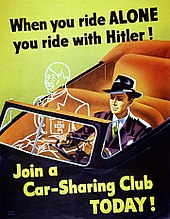
HISTORY OF CARPOOLING
2020-07-28
Carpooling (also car-sharing, ride-sharing and lift-sharing) is the sharing of car journeys so that more than one person travels in a car, and prevents the need for others to have to drive to a location themselves.
By having more people using one vehicle, carpooling reduces each person's travel costs such as: fuel costs, tolls, and car depreciation. Carpooling is also a more environmentally friendly and sustainable way to travel as sharing journeys reduces air pollution, carbon emission, trafic congestion on the roads, and the need for parking spaces. Authorities often encourage carpooling, especially during periods of high pollution or high fuel prices. Car sharing is a good way to use up the full seating capacity of a car, which would otherwise remain unused if it were just the driver using the car.
Carpooling first became prominent in the United States as a rationing tactic during World War II. Ridesharing began during World War II through “car clubs” or “car-sharing clubs”. The US Office of Civilian Defense asked neighborhood councils to encourage four workers to share a ride in one car to conserve rubber for the war effort. It also created a ride sharing program called the Car Sharing Club Exchange and Self-Dispatching System. The following poster used to promote carpooling in the U.S. as a way to ration gasoline during World War II.

Carpooling returned in the mid-1970s due to the 1973 oil crisis and the 1979 Energy crisis. At that time the first employee vanpools were organized at Chrysler and 3M.
Carpooling declined precipitously between the 1970s and the 2000s, peaking in the US in 1970 with a commute mode share of 20.4%. By 2011 it was down to 9.7%. In large part this has been attributed to the dramatic fall in gas prices (45%) during the 1980s. Recently, however, the Internet has facilitated growth for carpooling and the commute share mode has grown to 10.7% in 2005. In Europe, long-distance car-pooling has become increasingly popular over the past years.

At RAFEEQ, we are adopting the philosophy of Carpooling in our region by connecting car owners who have empty seats with co-travellers traveling to the same destination. We believe it is the right way to have low-cost travel and friendly environmental transportation methods.
Other News


Vitae soluta nihil culpa quidem nesciunt laborum.
Eum et labore et neque ducimus quaerat omnis moles...

